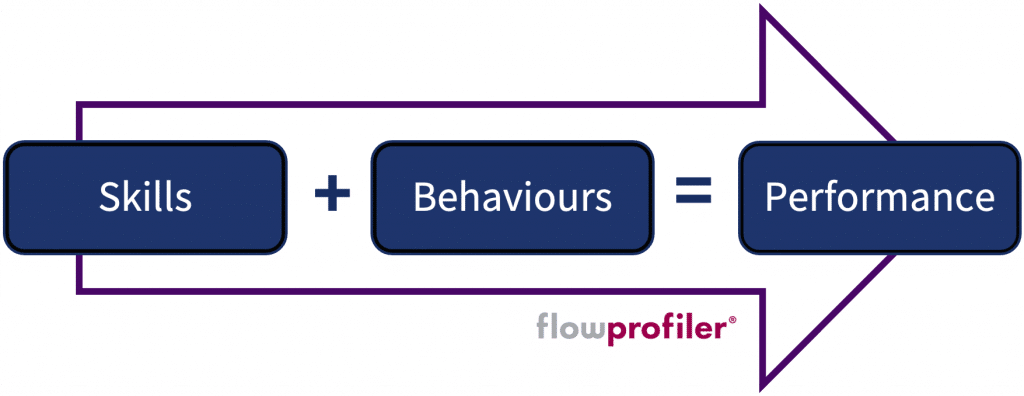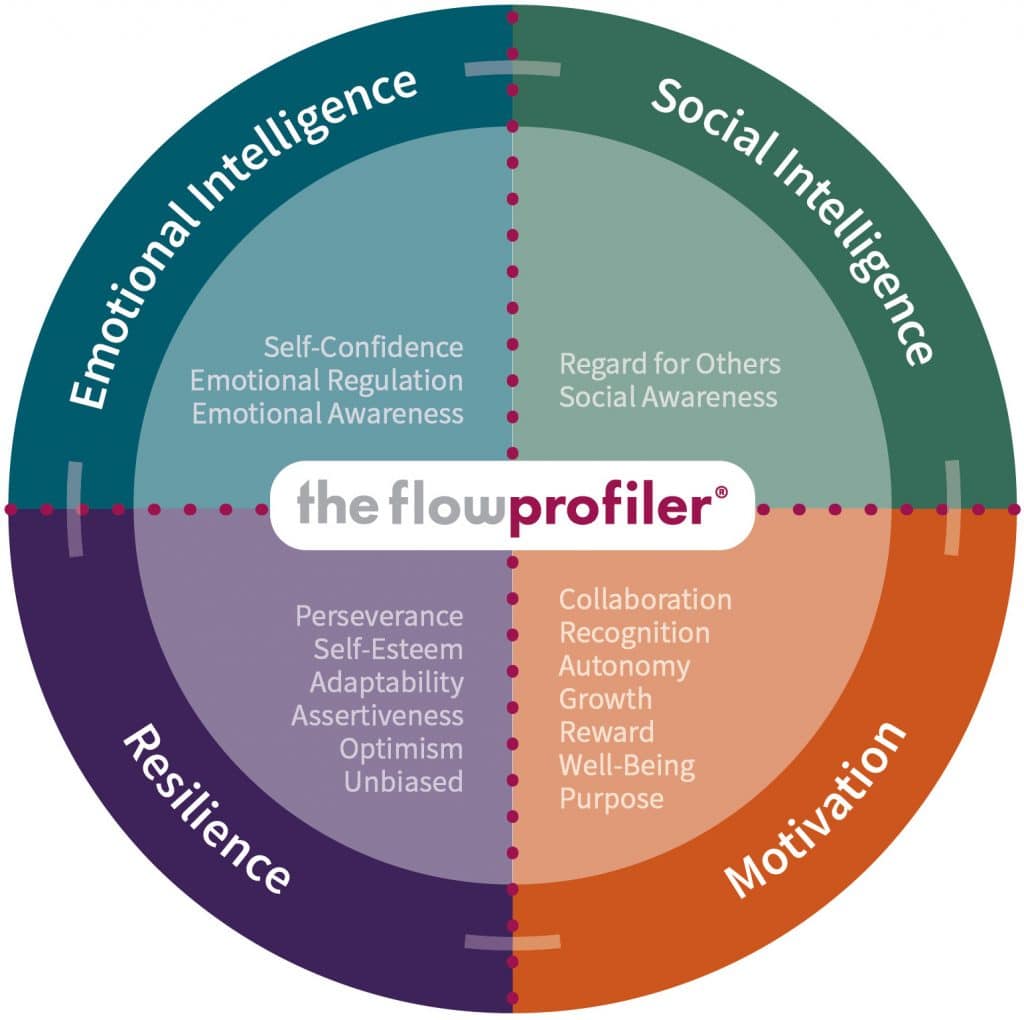Leaders are increasingly challenged to adapt their behaviour and decision-making strategies to guide their teams through uncertainty. An adaptive leadership style becomes crucial during change. Adaptive leadership strategies emphasise flexibility, responsiveness, and the ability to evolve in response to emerging challenges. These leadership competencies are essential in change management.
guide their teams through uncertainty. An adaptive leadership style becomes crucial during change. Adaptive leadership strategies emphasise flexibility, responsiveness, and the ability to evolve in response to emerging challenges. These leadership competencies are essential in change management.
Adaptive leadership is not just about making quick decisions; it’s about understanding the human dynamics at play and aligning leadership behaviours with the needs of the moment. One of the most effective tools for enhancing adaptive leadership is the behavioural assessment flowprofiler®. flowprofiler® is an innovative assessment tool designed to increase self-awareness and improve leadership effectiveness.
In this article, we’ll explore how adaptive leadership plays a critical role in change management and how flowprofiler® can empower leaders to make better, more informed decisions during periods of change.
Understanding Adaptive Leadership
Adaptive leadership is a framework that was popularised by Ronald Heifetz and Marty Linsky. Unlike traditional leadership models that focus on authority and control, adaptive leadership emphasises the need for leaders to:
- be flexible
- learn from experience and,
- adjust their strategies as circumstances evolve.
This approach is particularly relevant in change management, where leaders must navigate complex challenges, uncertainty, and resistance from various stakeholders.
At its core, adaptive leadership is about being attuned to the emotional and psychological states of team members and responding appropriately. This requires a leader to be highly self-aware, emotionally intelligent, and capable of regulating their behaviour in response to the needs of the situation. When leaders foster an environment where adaptation is encouraged, they help their teams remain resilient and focused, even in the face of significant disruption.
The Role of Behavioural Competencies in Adaptive Leadership
Behavioural leadership competencies are the observable and measurable skills and behaviours that contribute to effective leadership. These competencies are not static; they can and should be adapted to meet the demands of different situations. In the context of adaptive leadership, key behavioural competencies include:
that contribute to effective leadership. These competencies are not static; they can and should be adapted to meet the demands of different situations. In the context of adaptive leadership, key behavioural competencies include:
- Emotional Intelligence: The ability to perceive, understand, and manage one’s own emotions, as well as the emotions of others. Leaders with high emotional intelligence can navigate the emotional landscape of change more effectively.
- Resilience: The capacity to recover quickly from difficulties and persist in the face of challenges. Resilient leaders are better equipped to maintain focus and drive during periods of change.
- Communication: Clear, transparent communication is essential in change management. Leaders must be able to articulate their vision, set expectations, and provide feedback in a way that motivates and engages their teams.
- Decision-Making: In a rapidly changing environment, leaders need to make informed decisions quickly. This requires the ability to analyse complex situations, weigh options, and consider the potential impact of different choices.
- Social Awareness: Understanding the perspectives and concerns of team members is critical in managing change. Socially aware leaders can build trust and foster a supportive environment that helps teams navigate transitions more smoothly.
The Importance of Self-Awareness in Adaptive Leadership
One of the key aspects of adaptive leadership is self-awareness, the ability to recognise and understand one’s own behavioural patterns and how they impact others. Self-aware leaders are more likely to recognise when their usual approach is not working and adjust their behaviour accordingly. This is where an assessment like flowprofiler® becomes invaluable.
flowprofiler® is designed to help leaders gain insight into their behavioural tendencies and how these tendencies influence their interactions with others. By providing a detailed analysis of a leader’s strengths and areas for development, flowprofiler® enables leaders to become more aware of their default behaviours, particularly under pressure.
This awareness is the first step in making deliberate choices to adapt their behaviour to achieve different, more effective outcomes.
“The greatest danger in times of turbulence is not the turbulence,
it is to act with yesterday’s logic.”
— Peter Drucker
How flowprofiler® Enhances Leadership in Change Management
In the context of change management, flowprofiler® offers several benefits that enhance adaptive leadership:
- Identifying Strengths and Weaknesses: flowprofiler® helps leaders identify their core strengths and potential areas of improvement. By understanding these aspects, leaders can better leverage their strengths while working on areas that may hinder their effectiveness during change.
- Increasing Emotional Intelligence: The assessment provides insights into emotional responses and how they influence decision-making and leadership style. Leaders who are more emotionally intelligent are better equipped to manage the stress and uncertainty that accompany change.
- Improving Decision-Making: With a clearer understanding of their behavioural patterns, leaders can make more informed decisions that are aligned with the needs of their teams and the organisation. flowprofiler® encourages leaders to consider different perspectives and potential outcomes before making decisions.
- Enhancing Communication: The insights gained from flowprofiler® can also improve communication by helping leaders understand how their communication style is perceived by others. This understanding can lead to more effective and empathetic interactions, which are critical during periods of change.
- Building Resilience: By highlighting how leaders respond to pressure, flowprofiler® can help them develop strategies to build resilience. Resilient leaders are better equipped to guide their teams through the ups and downs of change, maintaining morale and productivity.
The Broader Impact of Adaptive Leadership and flowprofiler® in Change Management
The integration of adaptive leadership and tools like flowprofiler® into change management strategies can have a profound impact on an organisation’s ability to navigate change successfully. Leaders who are self-aware and capable of adapting their behaviour are more likely to foster a culture of agility and resilience within their teams. This culture not only helps in managing current changes but also prepares the organisation to handle future challenges more effectively.
Moreover, adaptive leadership supported by flowprofiler® can lead to better employee engagement and retention. When employees feel that their leaders are attuned to their needs and responsive to their concerns, they are more likely to remain committed to the organisation, even during turbulent times. This can result in a more stable and motivated workforce, which is crucial for long-term success.
“Change is the law of life. And those who look only to the past or
present are certain to miss the future.”
— John F. Kennedy
Adaptive leadership strategies mean that leaders are more likely to be flexible, emotionally intelligent, and responsive to the needs of their teams. These leaders can guide their organisations through change with greater effectiveness.
What can organisations do?
As organisations continue to face new challenges and opportunities, the ability to adapt will remain a critical determinant of success. Leaders who embrace adaptive leadership strategies and leverage tools like flowprofiler® will be better positioned to navigate the complexities of change. This will ensure that their organisations not only survive but thrive in the face of uncertainty.
The role of assessments like flowprofiler® in this process cannot be overstated. By increasing self-awareness and providing actionable insights into behavioural tendencies, flowprofiler® empowers leaders to make more informed choices that lead to better outcomes.

Our new 2 day workshop, Leading Through Change, combines adaptive leadership strategies, objective feedback and a rigorous change management process to give your leaders the edge.
Reach out to us at hello@flowprofiler.com and we can show you how it works.

- Heifetz, R. A., & Linsky, M. (2002). Leadership on the Line: Staying Alive through the Dangers of Leading. Harvard Business School Press.
- Goleman, D. (1995). Emotional Intelligence: Why It Can Matter More Than IQ. Bantam Books.
- flowprofiler®. (n.d.). www.flowprofiler.com.




